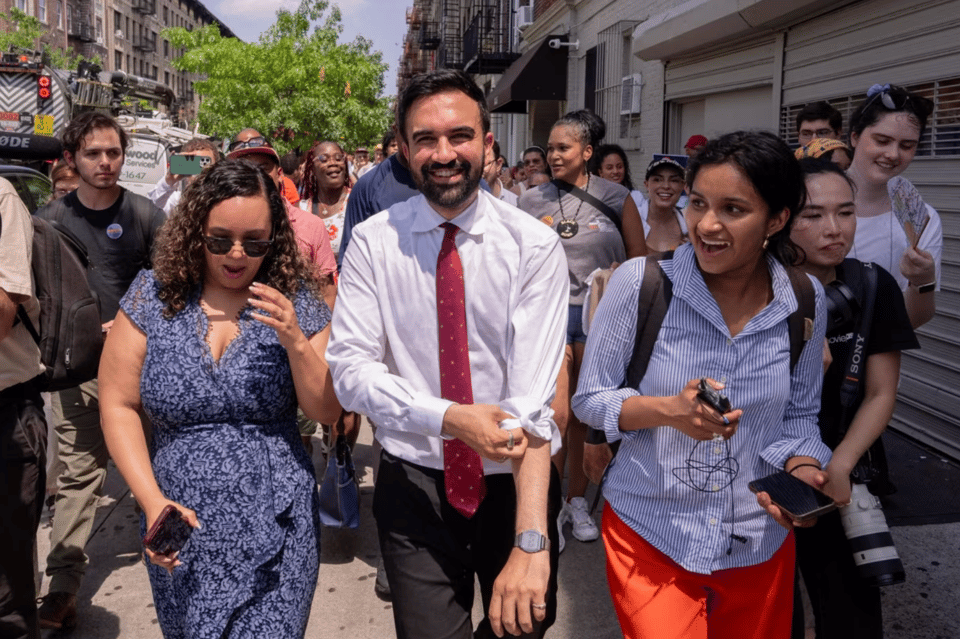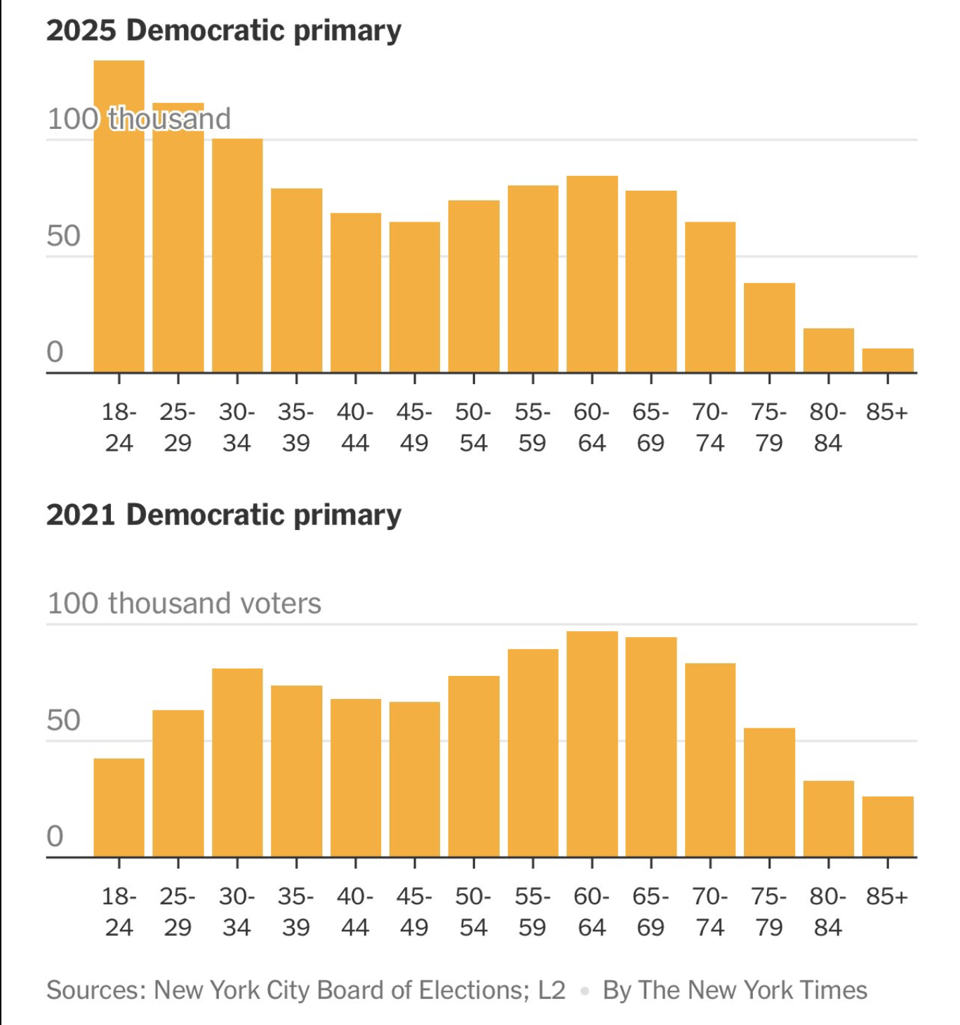The Zohran Effect: Keeping ScOR #10
Two weeks have gone by since New Yorkers voted, and Zohran Mamdani’s victory as the Democratic nominee for mayor became official last week. Mamdani’s shockingly decisive victory – over the vastly better-known and -funded Andrew Cuomo and several other established NYC politicians – is the political earthquake of the year so far. It’s the race that launched a thousand takes, from the celebratory to the wary to the hysterical.

The extreme reaction from the MAGAfied right is no surprise. The 33-year-old state assemblyman, a self-described democratic socialist who would be the first Muslim New York mayor, was dubbed a communist and an antisemite who should be stripped of his U.S. citizenship and deported. These histrionics managed to be eyebrow-raising in their bigoted dishonesty and at the same time deathly boring. Of course Marjorie Taylor Greene would post an image of the Statue of Liberty draped in a burqa.
More important, though also predictable, is the arms-length treatment of Zohran by some establishment Democrats. The party’s two top leaders in Congress, Senator Chuck Schumer and House Minority Leader Hakeem Jeffries, congratulated Mamdani but have not endorsed him. Other Democrats went further to distance themselves and in the process reinforced smears against the candidate. “I’m not a socialist and I don’t associate myself with what he has said about the Jewish people,” Eric Swalwell, the California Congressman, told CNN – without citing what Mamdani has supposedly said about “the Jewish people.” (Mamdani does criticize the Israeli government. Conflating Jews with Israel is generally considered antisemitic. Mamdani doesn’t do that. Swalwell did.) New York Senator Kirsten Gillibrand said in a radio interview that Jewish New Yorkers were “alarmed” by Mamdani’s past public statements, “particularly references to global jihad.” Gillibrand apologized when she learned Mamdani had made no such references. (More below on the “global intifada” kerfuffle.)
It's fair to say that Mamdani’s victory is making mainstream Democrats squirm not just because of words he may or may not have said. In the middle of a fraught debate amongst the broad left about how to proceed after the disastrous 2024 election, Mamdani won a stunning victory in the nation’s largest city while setting himself apart, unabashedly and with a smile, from the posture and the policies of his party’s establishment. This, it seems clear, is why Zohran generated so much excitement, especially among young New Yorkers, and it’s a central reason he won the nomination.
Without apology
After the election last November, we did a special episode on Scene on Radio – a conversation with four of my past co-hosts to discuss that election’s meaning. When we got to the “why Trump won” question, several of us broadly agreed that Kamala Harris and the national Democrats had failed to tell a compelling story about what’s wrong in the country, or to offer a convincing set of policies to address society’s biggest problems. “As the opposition to authoritarian klepto-fascism, you can’t be like, ‘how about center-right moderation?’ That’s not appealing!” said Amy Westervelt, my co-host for Season 5, The Repair. “What you’re offering is some kind of mealy-mouth compromise? No.”
I mentioned that in polls, 75% of Americans reported feeling financially insecure in 2024. Trump, I suggested, had offered a clear narrative, albeit a wildly dishonest one, that responded to Americans’ sense of precarity; he blamed immigrants and wokeness and promised to bring down costs. Harris, by contrast, offered tweaks such as small business tax breaks while defending the Biden economy.
As Chenjerai Kumanyika, co-host of Seasons 2 and 4, put it in that conversation: “Democrats are not really offering people anything ... and they won’t acknowledge all these problems. Including a genocide, which they are actively supporting.”
The lack of enthusiasm for what the Dems were selling in 2024 was unmissable in New York. Kamala Harris won NYC easily, but her vote total in the city fell more than half a million short of Biden’s in 2020 – a staggering 25% drop-off for the Democratic standard bearer. Trump got (only) 100,000 more votes in 2024 than in 2020, indicating that most New York Democrats who chose not to vote for Harris either stayed home or skipped voting for president. There’s no doubt that the Biden-Harris Administration’s staunch rhetorical and material support for Israel, as it slaughters and starves Palestinian civilians, played a big role in turning off progressive voters in NYC and elsewhere.
Enter Zohran Mamdani. Little known before 2025, he came with an agenda sharply focused on making New York more affordable for people who aren’t rich – with specific policy prescriptions: A rent freeze on the city’s rent stabilized apartments. Free city buses. Free childcare. A $30 minimum wage. A pilot program to open city-run grocery stores, one in each borough, to address food deserts and high grocery prices.
Democrats are desperate to find candidates who can catch fire with voters in the age of Trump.
To pay for these things he proposes to raise the corporate tax rate and apply a 2% city income tax on those earning more than $1 million a year. (The surtax would apply to income above the $1 million threshold, not a taxpayer’s entire income.)
If Zohran wins the general election, we’ll see whether he can make his policy proposals happen and whether they’ll work. But he’s the rare U.S. politician who offers a real critique of our neoliberal capitalist economy and its monstrous concentration of wealth at the top — and aims to do something substantial about it. On election night, Mamdani said he’d like his campaign to be a model for a Democratic Party that “[fights] for working people without apology.” He added, “We can demand what we deserve.”
Gaza
Mamdani’s views on Israel and the Gaza war were not central to his campaign – he’s running to be mayor of a U.S. city, not president – but he calls for Palestinian rights and criticizes the Israeli government for its actions not only since October 7 but over decades of occupation and subjugation of the Palestinian people. This posture, too, almost certainly helped Zohran more than it hurt him. Polls increasingly show Americans’ support for Israel slipping while it grows for Palestinians. According to a recent survey, more Democrats now sympathize with Palestinians than with Israelis in the conflict, and Democrats younger than 50 side with Palestinians by an overwhelming 57-point margin.
Mamdani didn’t just win big among the young New Yorkers who voted. He moved young people to vote in explosive numbers. Look at the left side of the graphs below. An election in which people under 30 are the largest voting block is just about unheard of in the United States.

Given Mamdani’s blunt criticism of Israel, it was inevitable he’d be accused of antisemitism. His Muslim faith and South Asian ethnicity – he’s of Indian descent – only make him more suspect to many Americans. He has repeatedly condemned antisemitism, calling it “a real issue in our city,” and announced plans to dramatically increase spending to fight hate crimes. He’s called Hamas’s October 7 assault on Jewish Israelis a “horrific war crime.” Brad Lander, the Jewish comptroller who also ran for mayor, cross-endorsed Zohran and campaigned with him. One pre-primary poll showed Mamdani running second among Jewish New Yorkers, behind Cuomo and just ahead of Lander. After the primary, Jewish Congressman Jerry Nadler, who represents much of Manhattan in the House, quickly endorsed Zohran.
None of the above matters to those who conflate criticism of Israel with antisemitism. For some backers of Israel, Mamdani’s support for the boycott, divestment, and sanctions (BDS) movement is disqualifying. But much of the antisemitism buzz surrounds something Zohran never said.
You may have seen the headlines declaring Mamdani “declines to condemn ‘globalize the intifada.’” This all started when Tim Miller of The Bulwark asked Zohran in a podcast interview how he feels about phrases that are sometimes heard at pro-Palestinian protests, and which many consider antisemitic, like “from the river to the sea” and “globalize the intifada.” Miller asked if such language makes him “uncomfortable.”
Choosing his words carefully, Mamdani reflected on the recent spate of anti-Jewish attacks and the justified fears that Jewish New Yorkers have expressed to him. As for the phrases, he said he’s “uncomfortable with the idea of banning certain words.” When Miller pressed him, Mamdani said he hears in those words “a desperate desire for equality and equal rights.” He pointed out that intifada is generally understood to mean “struggle.”
After that interview, several other journalists picked up the baton, pressing Zohran to condemn the phrase “globalize the intifada.” He declined while clarifying that it’s not language he uses.
Excuse me. Does anyone here think Mamdani would have been asked repeatedly to condemn these particular words, which he’s never been accused of saying himself, if he weren’t a brown Muslim?
What others won’t say
Democrats are desperate to find candidates who can catch fire with voters in the age of Trump. They disagree, often bitterly, about what such candidates would look like. Should they compromise on the issues and move closer to Trumpism – for example, on immigration and the border — or offer a boldly progressive alternative? Is policy even the key thing, or is it messaging or even just vibes?
You don’t have be a democratic socialist to say true things about our second Gilded Age.
Mamdani has more than his policy agenda going for him. He’s young and charismatic. He ran an energetic campaign with a creative social media strategy. But on the substance, his extraordinary rise looks like validation for one side of that argument between centrist liberals and progressives. Chalk one up for those who say Democrats should answer Trump’s faux populism with a real economic populism that rejects the party’s marriage to corporate interests. “I don’t think we should have billionaires,” Zohran said flatly, though still smiling, on Meet the Press.
Mamdani’s precise script might not work in much of the country, but you don’t have be a democratic socialist to say true things about our second Gilded Age. Take Dan Osborn, the steamfitter and labor leader who ran last year for the U.S. Senate as an independent in deep-red Nebraska and came within seven points of upsetting the Republican incumbent – far outperforming Kamala Harris in the state. Osborn launched a political action committee to support working-class candidates of all parties, and just announced he’ll run against the state’s other GOP Senator in 2026 on a “worker’s agenda.” He criticizes pols in both parties for doing the bidding of their corporate sponsors.
For all their differences, Osborn and Mamdani have this in common: they come across as people who call things as they see them without first consulting donors or pollsters.
This may be the one and only way in which Mamdani resembles Donald Trump. Trump’s supporters often say they appreciate his unfiltered “authenticity.” Yes, it’s weird to call a habitual liar authentic, to say that Trump “tells it like it is.” But on big wedge issues that most politicians dance around or triangulate, Trump’s blunt (and often racist) remarks do cut through and resonate. I’ve heard it directly from his supporters: “He says what a lot of people are thinking but no other politician will say.”
I’d venture that a bunch of New Yorkers, and hungry would-be voters across the country, would say the same about Zohran Mamdani.
Do you like Keeping ScOR? Pass it on. Please forward this to a friend — or several.
Add a comment: